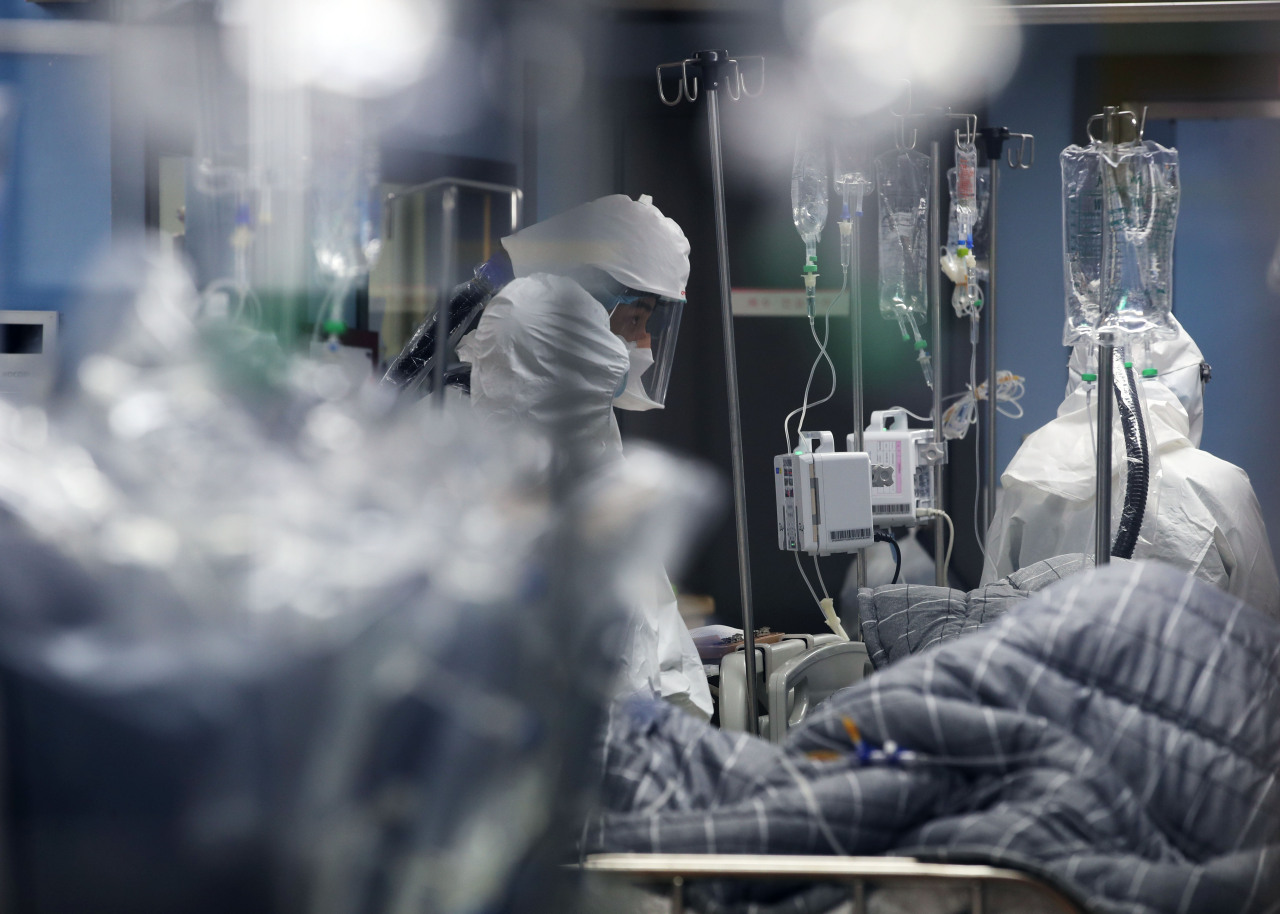 |
Health care workers take care of COVID-19 patients at the critical care ward of a hospital in Pyeongtaek, Gyeonggi Province, on Wednesday. (Yonhap) |
Hospitals in South Korea are running at near-full capacity and cannot add any more beds, the government said Thursday as the number of patients hospitalized with severe COVID-19 hit a record level.
Ministry of Health and Welfare spokesperson Son Young-rae told reporters in a closed-door briefing that securing additional intensive care beds was “probably difficult.”
As a result of recent orders from the government for hospitals to make room for COVID-19 patients, more than 100 extra intensive care beds were added over the past few weeks. There are 1,135 fully staffed intensive care COVID-19 beds across hospitals now, according to the ministry’s count, 71 percent of which had been filled as of Wednesday.
“Hospitals have reached their limit. Creating extra bed capacity further raises concerns that medical resources will be depleted,” he said. “About 10 percent of nationwide critical care resources are already devoted to treating COVID-19 patients.”
Thursday’s assessment comes after the nation posted more than 3,200 new cases every day for the past week. Ahead of the Nov. 1 return to normal, the ministry had said the health care system was equipped to handle up to 5,000 cases per day without breaking.
Also on Thursday Korea announced that 612 patients were critically sick with COVID-19 -- the highest-ever number -- breaking records set in the last two days, 586 on Wednesday and 549 on Tuesday. The number of newly diagnosed patients in a day also reached the second-highest total, 3,938, down from the record high of 4,115 seen Wednesday. Thirty-nine patients died with COVID-19 in the 24-hour period, bringing the seven-day average of daily deaths to 31.
In all of Seoul just 112 intensive care beds remained vacant as of Wednesday afternoon. The total intensive care occupancy rate in the city stood at 83 percent, well above the 75 percent threshold for initiating an emergency plan that involves pausing the reopening.
Hundreds of COVID-19 patients continue to wait in and around Seoul for hospital care as beds run short. As of the latest count available on Tuesday, 778 patients had been waiting for beds to open up, 374 of whom were in their 70s or older.
In a departure from earlier statements, Son of the ministry said in response to press inquiries during the briefing that Korea “is already implementing some emergency measures, such as expansion of bed availability.” As recently as Tuesday the spokesperson said in a briefing that it was “not necessary” to activate the emergency plan or restore restrictions, based on risk assessments.
To expedite the turnover of intensive care beds, Korea is extending eligibility for home recovery to patients ages 70 and older who are vaccinated and discharging patients from intensive care earlier, transferring them to “step-down” beds.
Thursday’s meeting of a government committee for the return to normal, which took place behind closed doors, addressed whether or not to reintroduce some of the restrictions, the ministry said.
Also on the agenda was widening the use of the vaccine pass system, which requires people to submit proof of vaccination or negative PCR test results before entering risky places. The pass might be required at businesses serving food, the ministry hinted. Minors ages 12 to 18 might be subject to the same entry requirements as adults.
As breakthrough infections hospitalize older adults, Korea aims to distribute boosters to 13 million people before the year ends, with Prime Minister Kim Boo-kyum saying Wednesday that “completing the vaccination against COVID-19 means three doses.” According to Nov. 14 data, 94 percent of the 710 patients who fell severely ill with COVID-19 after being fully vaccinated were in their 60s or older.
Since the booster rollout began last month, 2.2 million people here have gotten an extra dose. Anyone 50 and older is eligible for a booster dose if more than five months have elapsed since the primary vaccine series.
By Kim Arin (
arin@heraldcorp.com)








